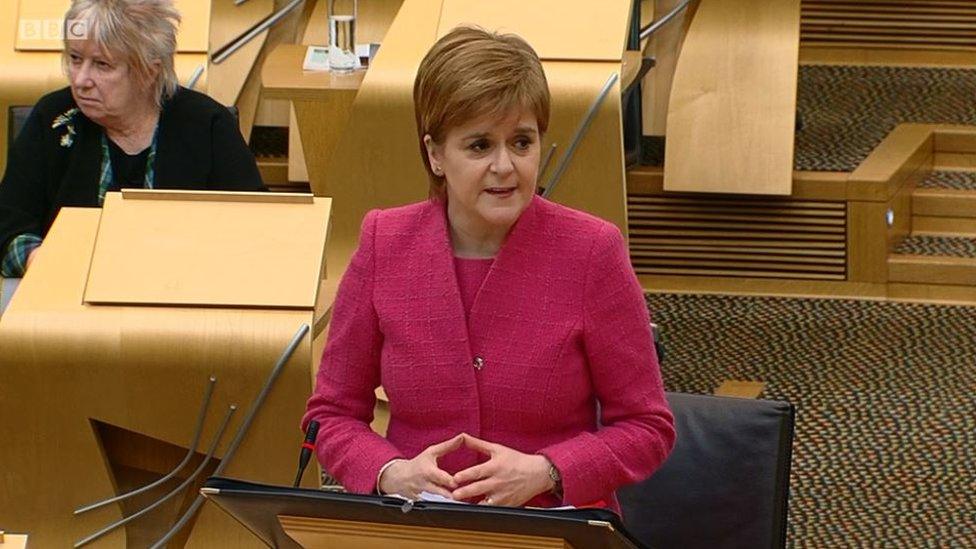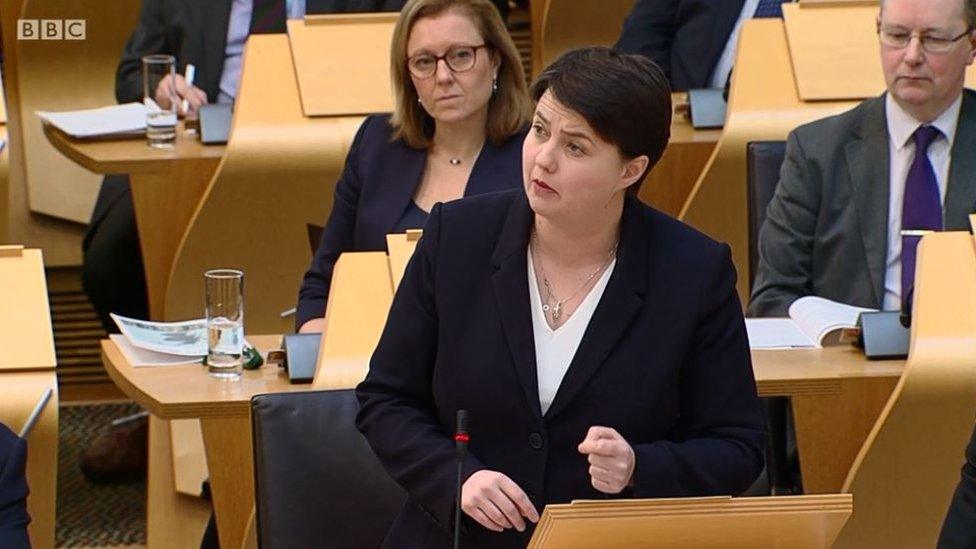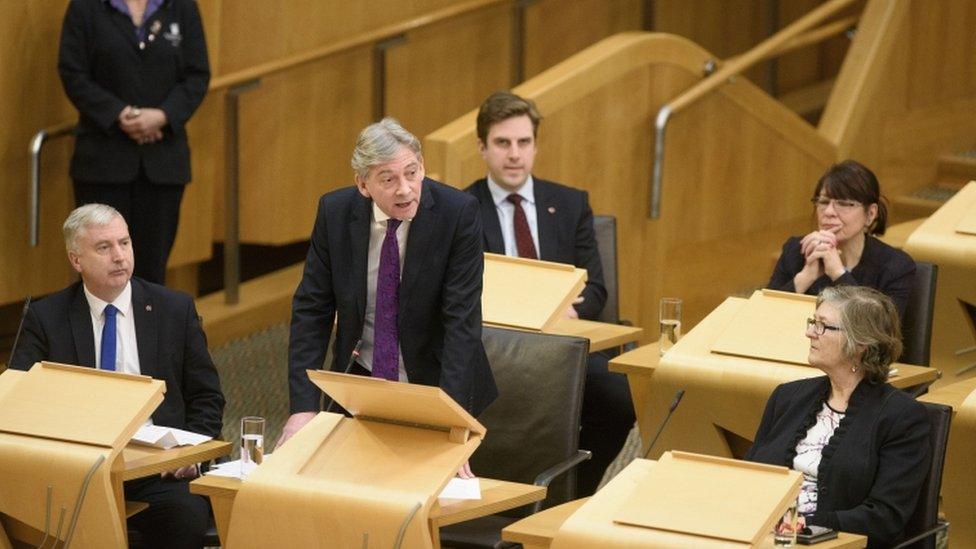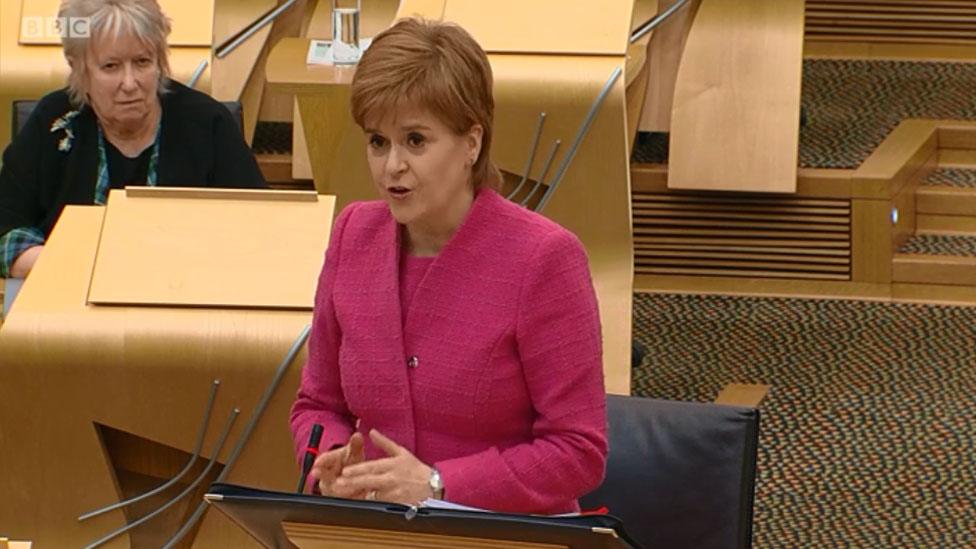No shortage of rhetoric at FMQs - just of novelty
- Published

Nicola Sturgeon defended her justice secretary from Tory attacks
Effort, there was, aplenty. Both Ruth Davidson and Nicola Sturgeon gave their all in verbal conflict as they discussed the continuing saga of Police Scotland's chief constable.
Ms Davidson accused the first minister of presiding over "secret Scotland". Lest a few deluded souls might regard this as a good thing, she added: "It stinks."
In response, Nicola Sturgeon accused the Conservative leader of "breath-taking hypocrisy". So, there was no shortage of rhetoric. Just novelty.
To recap, the chief constable is on a leave of absence while sundry matters are investigated. He denies all wrong-doing and believes he will be exonerated.
At one point, it seemed his return to work might be accelerated, even as investigations continued. At least, so thought the Scottish Police Authority board and their former chairman.
This raised question marks in the mind of the Justice Secretary Michael Matheson, when he was appraised of the prospect. He duly raised said questions with the then SPA chair and the decision was reversed.
Ms Davidson again characterised this as unacceptable interference and, quite possibly, unlawful. Ms Sturgeon, again, defended the justice secretary. He had not interfered directly. He had, within his powers, set parameters for the SPA.
The Tory leader persisted. The meeting had not been minuted (we were told last week that a note re decisions had been sent round instead).

Ruth Davidson charged the SNP with presiding over "secret Scotland"
All power to those who seek openness and clarity in governance. It is the core of journalism. But, as a number of ministers and former ministers have also noted, it cannot be the case that every discussion within government is instantly published in full.
If that were to be the case, then canvassing options and looking at ideas - which may later be rejected - would be impossible. Sentient thought, in short, would be stifled, to be replaced by instantaneous action.
Ruth Davidson knows that perfectly well and, indeed, would follow such habits were she to achieve her objective of becoming first minister.
There followed later a neat little second act cameo. Labour's Monica Lennon asked, with a knowing grin, how the FM regarded the campaign "Get it Minuted" by the Campaign for Freedom of Information.
Without a blush, Ms Sturgeon backed the campaign - or, more precisely, noted that her administration was more open than predecessors and followed guidance to the letter.

Richard Leonard pursued the topic of elderly care
When it was his shottie, Labour's Richard Leonard pursued a vital topic, that of elderly care. And he pursued it rather well, adducing evidence to bolster his case that the sector was nearing collapse.
Ms Sturgeon did not recognise the description offered by the Labour leader. But she could see a chasm opening before her. She knows that elderly people, and their relatives, are gravely concerned over the issue of residential care.
So the FM offered discussion and promised action, where necessary and possible, to remedy any gaps which may exist or may emerge.
Sensibly, Mr Leonard built upon this, equally aware that bombast is unwelcome in this field. He acknowledged the FM's positive tone but urged her to act more vigorously and more rapidly.
It couldn't last, of course. Ms Sturgeon also felt constrained to note, albeit in a deliberately understated fashion, that she had yet to hear precise taxation and spending proposals from the Labour benches.
However, as I said, an effective intervention by the Labour leader. Only slightly spoiled later.
Mr Leonard had named an individual, suggesting en passant that she had dementia. His aides were obliged to confirm that dementia had not been diagnosed; that there were instead dementia-like symptoms.
Patrick Harvie of the Greens pursued the topic of short-term lets. He complained that sectors of Edinburgh in particular were dominated by such practices. Whole tenements, he said, were becoming virtually mini-hotels. Ms Sturgeon said a review was in place.
- Published18 January 2018
